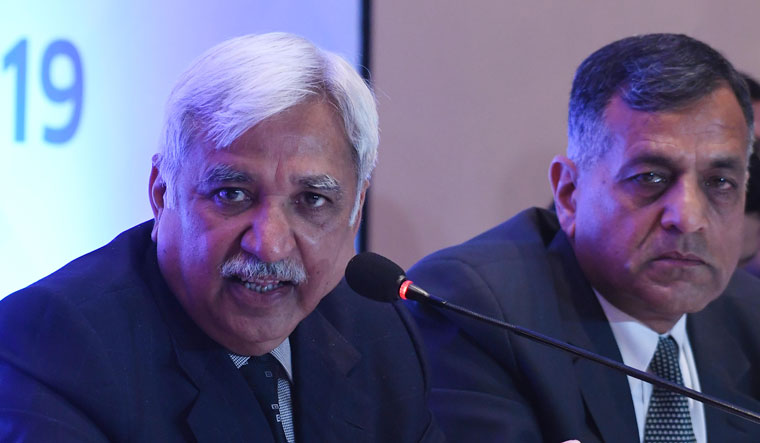The Election Commission found itself in the eye of a storm on Saturday when news of Election Commissioner Ashok Lavasa's decision to stay away from meetings pertaining to the violation of the Model Code of Conduct began to trend.
Responding to the reports, Chief Election Commissioner Sunil Arora said in a press release that "the three members of the Election Commission of India are not expected to be templates or clones of each other." In a somewhat tersely worded press note, the office of the chief election commissioner stated, “There have been so many times in the past when there has been a vast diversion of views as it can and should be.”
The Model Code of Conduct is one of the 13 issues that the Election Commission had unanimously identified in its meeting of May 14 for deliberation by small groups to be formed, on issues that arose in the course of the conduct of the Lok Sabha 2019 elections. Such an exercise had been carried out in 2014 too.
At the heart of the controversy is the issue of whether the minority decisions, which are not unanimous even though they enjoy majority concurrence, be made public. As of now, there is a preference for unanimous views and majority decisions in the Election Commission.
Election Commissioner Ashok Lavasa had stopped attending meetings to decide on violations of the Model Code of Conduct over his "minority decisions going unrecorded". Some "minority decisions recorded by me in several cases continue to be suppressed in a manner contrary to well-established conventions observed by multi-member statutory bodies," Lavasa wrote to the chief election commissioner on May 16.
"… It appears futile for me to participate in the deliberations of the commission until its lawful functioning is restored in terms of including the minority decisions recorded by me," Lavasa said, according to those had accessed his letter.
"In the present circumstances, I am left with no option but to keep away from such proceedings. I may also take recourse to other requisite measures in respect of the above (lawful functioning of the commission in terms of including my minority views)," Lavasa said.
The chief election commissioner and the Election Commission had officially preferred silence even as its role came into controversy over a number of cases of violation of the Model Code of Conduct involving Prime Minister Narendra Modi and BJP president Amit Shah the last few weeks.
It was only following the Supreme Court's direction that the Election Commission dispose of the cases against the two that the election regulator acted. The Election Commission cleared Modi and Shah of charges of violating the Model Code of Conduct, in the course of which Lavasa had expressed dissent, which was not recorded in the commission's order.
The chief election commissioner also pointed out that the “vast diversion of views” in the past had “largely remained within the confines of the Election Commission after the demission of office unless appearing much later in a book written by the concerned EC/CECs”.
Asserting that he had personally “never shied away from a public debate whenever required” Arora said there was a “time for everything.” “There was a reason, I said few days back in another leading daily that eloquence of silence is always difficult but far more desirable, which is far to see the election process through instead of creating ill-timed controversies.”
And Arora took exception to the timing of it all, saying it has come at a time “when all the CEOs throughout the country and their teams are geared for the seventh and last phase of polling on May 19, followed by the gigantic task of counting on May 23.”
Meanwhile, the Congress party's communications in-charge Randeep Singh Surjewala argued “Omitting the dissent of Election Commissioner (Ashok Lavasa), simply because he asked for a notice to be issued to Prime Minister Modi, has severely tarnished the institutional integrity of the Election Commission”.
According to the Congress, “Prime Minister Modi has taken upon himself the task of denigrating, damaging, decimating, dislodging and diminishing the sanctity of every institution of India.”
also read
- How the Election Commission is planning to woo voters after low turnout in Phase 1
- ‘Important first step’: Congress on SC notice to Election Commission on counting VVPAT slips
- ‘Remain careful in public utterances’: EC censures BJP's Dilip Ghosh, Cong's Supriya Shrinate
- SBI makes 'complete disclosure', submits all details of electoral bonds to EC
The Congress press note also says, “The poll panel's rules express preference for a unanimous view but provide for a majority ruling in the absence of unanimity. Being a constitutional body, the minority view has to be recorded, but this is being trampled to protect Modi-Shah duo.”
Earlier, the chief election commissioner had maintained that only minority views in quasi-judicial proceedings can be recorded in the orders and the decisions on poll code complaints are not quasi-judicial proceedings, so minority views need not be recorded.
Arora has described the Lavasa issue and its reporting in the media as an “unsavoury and avoidable controversy about the internal functioning of Election Commission of India with respect to the Model Code of Conduct”.



